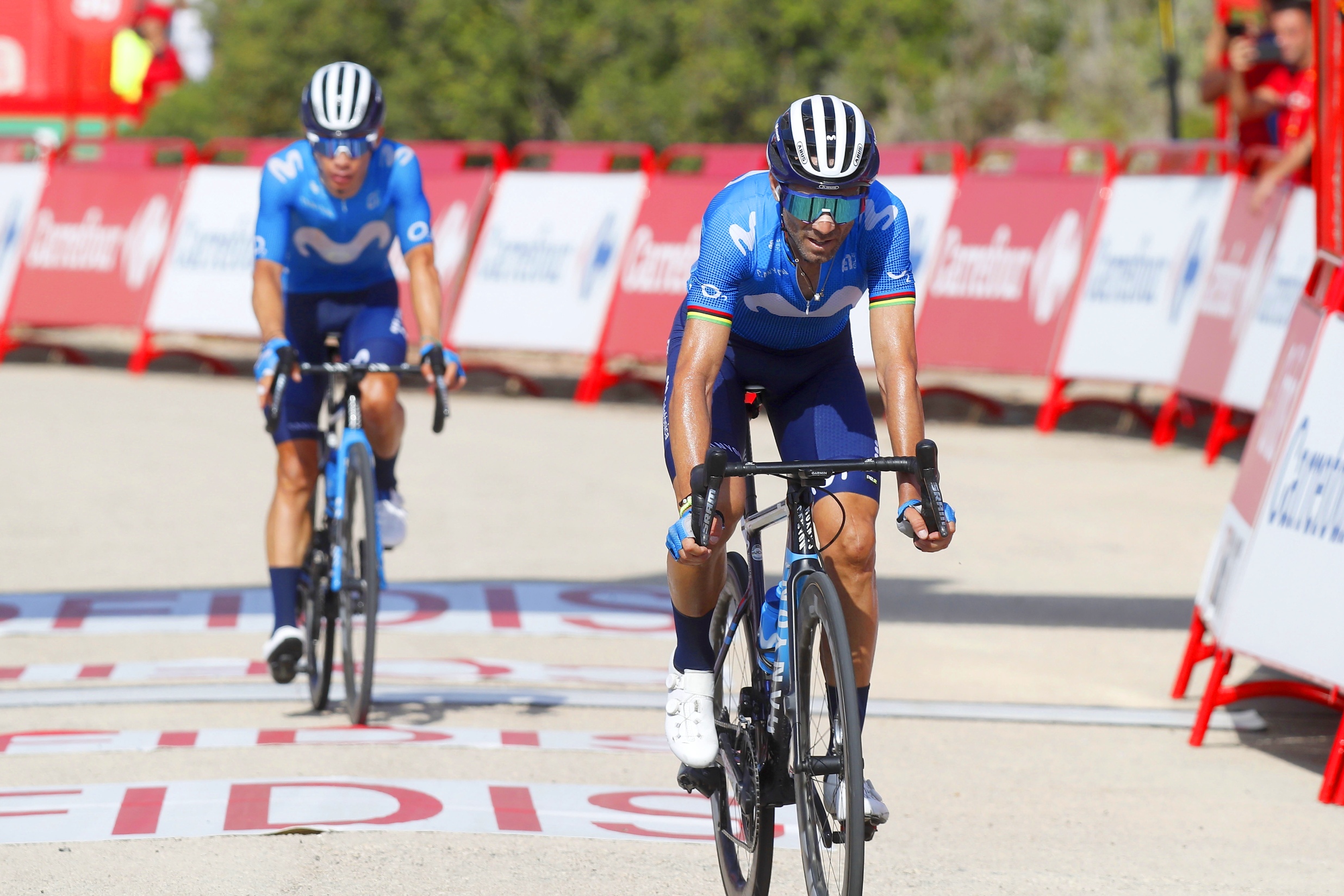Movistar rue loss of Valverde but fight on at Vuelta a España
Spanish star fractures collarbone as Mas and López continue GC battle

A brutally difficult day for Movistar at the Vuelta a España saw 2009 winner Alejandro Valverde crash out of the race on stage 7 in his high-speed fall.
For many the team's most emblematic rider, Valverde skidded off road shortly and fell heavily moments after launching an attack in the main peloton, and although he did manage to remount his bike and pedal on for a few more kilometres, the Spaniard finally had to quit.
Movistar subsequently reported on Twitter that hospital X-rays showed Valverde did not have any broken bones from his fall, and that his other injuries were being treated. However further scans and checks on his right shoulder and hip confirmed a collarbone fracture. The team said Valverde will undergo an operation in Murcia on Saturday.
Valverde's abrupt exit from the Vuelta a España is his first abandon since his first ever participation, way back in 2002.
It also comes less than 24 hours before the Vuelta was due to reach Valverde's home region of Murcia, in the stage finishing on La Manga del Mar Menor, and where a warm reception by spectators for one of the region's biggest sports stars was a virtual certainty.
Valverde had said before the race he had no GC aspirations in the 2021 race, and that he would "settle for a stage win and a podium for our two leaders," Enric Mas and Miguel Angel López.
But after a strong showing on the Picón Blanco and again at Cullera, Valverde was lying fourth overall and for now he could have been another GC option for the Movistar squad in what was his 15th Vuelta.
Get The Leadout Newsletter
The latest race content, interviews, features, reviews and expert buying guides, direct to your inbox!
To their credit, Movistar battled on despite the huge setback, with Carlos Verona pushing stage winner Michael Storer (Team DSM) hard for the day's victory, and Miguel Angel López stretching the GC group out with several sustained but not explosive attacks on the final climb of the Balcón de Alicante.
"The win was close even though at first I wasn't thinking about the stage, we were always racing thinking about the GC riders behind," Verona said later.
"In fact Patxi [Vila, sports director] told me that Alejandro was going to attack, and I had been taking things easy, waiting for him to make his move.
"But suddenly the radio went quiet, I couldn't understand anything they were saying… and straight after that, they'd told me that Alejandro had fallen. I hope he's ok."
Verona then switched strategies, and his stage hunt began, attacking on the flatter sections of the final climb in order to try and distance the out-and-out mountain specialists where best he could.
However, the Madrid-born racer admitted that once stage winner Storer had regained contact on such a difficult ascent, there was little he could do. "He's a featherweight, and I weigh 70 kilos, and that's what made the difference."
Together with Adam Yates (Ineos Grenadiers) López was the only GC contender who tried to test Roglič on the Balcón de Alicante. But rather than discussing his performance in detail, the Colombian highlighted his regrets and concerns about Valverde's abandon.
"We're all sad about the news that Bala is no longer in the race," López commented, "The team has lost a great deal."
"He was a rider who gave us a great deal of confidence and security, and a key sort of rider on days like today. In a small group of contenders, we could always get ahead thanks to him."
López said he had not seen the fall itself, because he was a little further back when Valverde attacked alongside fellow-Murcia racer and teammate Jose Joaquín Rojas.
"When we came past the place where he fell, there wasn't anybody on the ground and I only found out later he'd fallen. We're really going to regret that he's had to quit."
Alasdair Fotheringham has been reporting on cycling since 1991. He has covered every Tour de France since 1992 bar one, as well as numerous other bike races of all shapes and sizes, ranging from the Olympic Games in 2008 to the now sadly defunct Subida a Urkiola hill climb in Spain. As well as working for Cyclingnews, he has also written for The Independent, The Guardian, ProCycling, The Express and Reuters.
